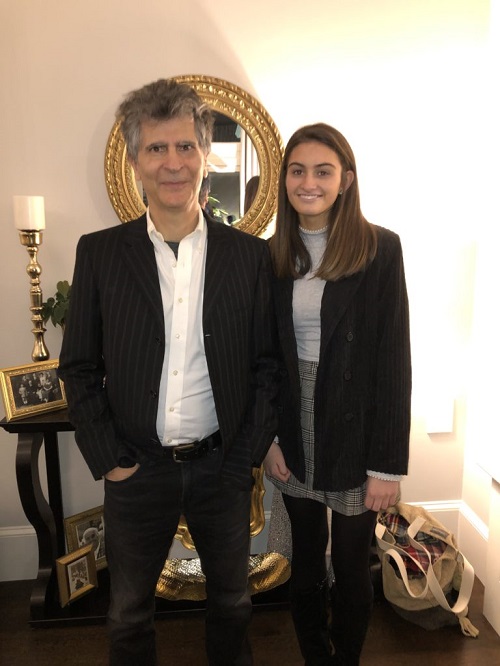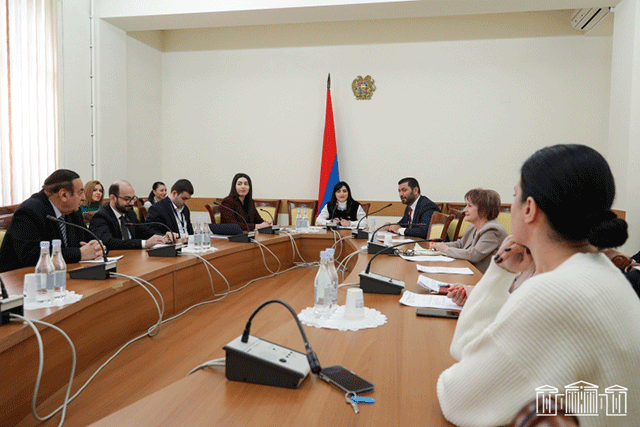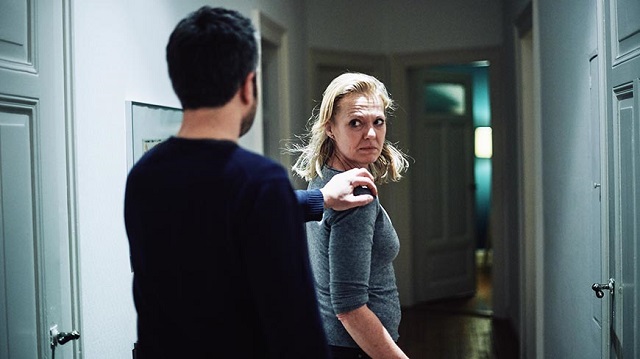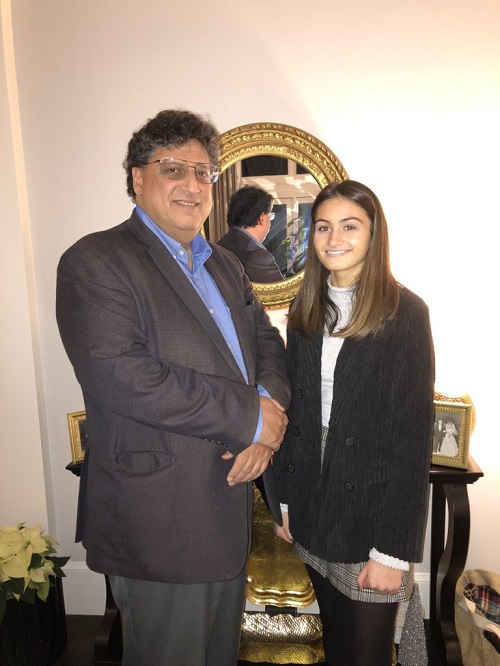The Armenian Mirror-Spectator. BOSTON — When is a bracelet not just a bracelet? When it helps a battered women’s shelter halfway around the world.
Ashley and Haley Kutzer, according to their mother, Donna Partamian-Kutzer, are both artistic and generous.
The two teen sisters started Hokistrings, a line of beaded bracelets, last year. All the money from the sale of the popular bracelets goes toward the Women’s Support Center (WSC), a shelter for women escaping domestic violence in Yerevan.
Ashley and Haley Kutzer present their check to Maro Matosian of the Women’s Support Center.
Read also
“My daughter Ashley has had a long-time hobby of making beaded jewelry. Last year she began a new design and her peers took an immediate liking to her bracelets. What was a simple hobby suddenly began to take up much more of her time as she was taking orders from many of her friends from school and at work. Ashley decided that she could ask people for a few dollars for each bracelet and then donate the money to a good cause. It was right around this time that Lenna Garibian spoke about WSC at an event at Holy Translators Church in Framingham. Ashley learned of the work that Maro was doing in Yerevan for the Women’s Support Center and she felt that this was a wonderful cause to support,” she said.
So far, they have donated $2,000 to the WSC.
Ashley Kutzer, 17, is a high school senior. Ashley said that her sister, Haley, 15, will take over in the fall, once she goes off to college.
According to their mother they have since received public and private notes of gratitude both on social media and handwritten from women in Armenia who have suffered from domestic violence thanking them for their generosity, and also from others who are simply inspired by their story.
Their mother beams with pride about the girls’ efforts. “It has been amazing to witness the passion that has gone into this project. The amount of time Ashley and Haley have spent on every tiny detail has been observed with pleasure. It warms my heart to see them work so diligently with the sole intent to help empower less fortunate women and children to get them to a place where they can live a much happier life,” she said. “I have never had any association with the WSC and only learned of it through Lenna’s introduction at an event at Holy Translators [Armenian Church of Framingham] in May of 2019.”
“Really so far everything has been so positive,” Ashley said.
In fact, the girls are planning to visit Armenia this summer and meet with Matosian.
Of course the goals are serious for the girls, but the bracelets are the star of the show. “We try to add new colors each season, like school colors and offer special deals,” Ashley said.
Haley, 15, is in the 10th grade and said she is thrilled about how popular the bracelets are.
“I would like to grow it into a non-profit especially because of the international sales,” she said.
And international sales are happening, thanks to a fortuitous meeting with Canadian actor David Alpay, a Canadian-Armenian actor, and frequent collaborator of director Atom Egoyan.
Ashley said that they met him over the summer and gave him a bracelet and told him about their project. He put the picture on Instagram and “we started getting random orders from various places, like Germany, Italy and Myanmar,” Ashley said.
Her sister added, “I am really excited how this affect’s the Women’s Support Center and how it will impact them.”
It takes many people to help. People like Nancy Barsamian, Laura Purutyan and Lenna Garibian have been “pivotal” with spreading the world about the WSC.
This is a story of old and new. Using both social media and traditional Armenian Church bazaars, the young ladies are raising awareness and funds.
The girls reached out to St. James Armenian Church bazaar organizers this fall to see if they could set up a table to sell their bracelets and raise awareness about the WSC. The church agreed and they set up a table to sell Hokistrings bracelets, while also distributing printed material about the WSC.
Women’s Support Center
Maro Matosian, the executive director of the WSC in Yerevan, and its founder in 2010, was in the Boston area recently, and spoke about the organization as well as its network of supporters.
The topic of domestic abuse is one that is not addressed freely in Armenia. In addition, police are only recently getting training about how to deal with an abuser and a victim.
Matosian said that the WSC has a three-pronged set of goals:
- Providing service to victims of domestic violence, including legal, psychological and housing
- Community education to train service providers, police, educators and reach out to the community, including youth to teach them about healthy relationships
- Advocacy, working with universities, state agencies to address response from an International point of view, advocating about laws, helping put in place a mechanism for police and social services.
“We are continuing to work with the Ministry of Social Affairs,” Matosian said.
“We annually deal with more than 300 cases,” Matosian added.
Laws were adopted in December 2017 to punish those guilty of domestic abuse and those were implemented in 2018.
Women are still somewhat outside the system, she noted.
“Women’s rights organizations are targeted in Armenia,” she said. “We want to penetrate the system. They accuse [the organizations] of breaking up families, bringing in ideas from the West and they want to maintain traditional values.”
Their shelter in Yerevan, she said, accommodates 74 women and children.
The group has an annual budget of $220,000, the majority of which comes from fundraising in diaspora, and primarily the US.
Matosian’s shelter has a staff of 14 based in Yerevan who serve throughout the city.
The center uses and needs everything from needle and thread to baby formula. The biggest expense for the center comprises food and hygienic products, such as detergent, diapers, toothpaste and cleaning supplies.
In addition to the shelter, the WSC has a transitional residence for the women ready to leave.
“There is a 30-percent increase every year. There are both more cases and more victims are able to talk about it,” she said.
Those from the outside looking at Armenia might assume that the country is egalitarian, but that is not the case, she said. “There is a lot of misinformation” about the work of organizations like her, which is “politically motivated.”
There is hope, though.
Now, with the new government in power, there is support for efforts like hers. “[Prime Minister Nikol] Pashinyan, the Minister of Justice and Health and Social Services, I’ve never seen such political will to promote women’s rights in Armenia, especially among the newer members of parliament,” Matosian said.
Matosian stressed that the methodology they use is in line with the best practices suggested by the United Nations, European Union and other International organizations.
“With the people who come to our center, we have to administer a risk assessment for lethality. If it is high, we recommend they stay at the shelter,” she said. “The majority come referred by the police. All of them suffer from trauma. They have difficulty sleeping, concentrating, remembering. Their entire system is out of balance. Within a week or 10 days, they begin to get back their equilibrium and function better.”
They usually stay in the shelter for 3 months. During that time, she said, they have to write down three goals they want to achieve. The shelter helps them with finding employment, renting apartments, vocational training and getting their children to school and dealing with health issues.
She stressed that they address the emotional and mental scars. “We try to restore their self-esteem, everything the perpetrator took away from them, give them the right to make decisions, the right to express emotions and offer them community interaction. We try to make them understand that they don’t deserve a life of abuse.”
And then there are the children. “We pay special attention to children who are very much affected by violence. According to the CDC [Centers for Disease Control], there is a high rate of suicide, health disorders that happen to children, as well as low performance. Domestic violence is learned behavior. The majority of boys become perpetrators and the girls enter this type of relationships,” Matosian said.

James Tufenkian and Ashley Kutzer at Tufenkian Foundation fundraiser on December 7 at Michael and Susan Guzelian’s home where Ashley was invited to speak
Visitors from Massachusetts
Nancy Barsamian, Carolyn Mugar and Laura Purutyan went to Armenia last year and visited the WSC shelter.
Matosian said, “They presented me with information about the two girls and offered bracelets to the women in the shelter. They told me about these teenagers who wanted to help the women.”
She was delighted. “It is very much empowering. When they offered the women bracelets, they said it is in solidarity with their plight. They [the women in the shelter] were very much moved by it.”
“I was telling Lenna [Garibian] how much I admire their initiative even more now. They are from an affluent family, living in a bubble, in the comforts of suburbia, sheltered from the ills of society. They live a life of harmony and plenty. It is rare to see such young people think about the needs of others and the plight of women,” Matosian said. “To think about the plight of abused women, not many adults even think about that.”
The generosity seems to be infectious, according to Matosian. “More and more people hear about it and are motivated to come to support.”
Lucine Kapreilian, another supporter of the WSC, offered praise for the girls and the volunteers. “This group of women and young ladies will continue to brainstorm ways to spread awareness about the issue of domestic violence in Armenia. We will help raise funds to support Maro’s incredible work at WSC and support the need to serve more women with the ultimate hope and goal that in years to come the need for such resources will subside.”
Nancy Barsamian is excited about the girls’ efforts. “I completely support their project and their desire to learn more about issues effecting women and children in Armenia. The Hokistrings project has made the adults involved motivated and optimistic about how this project will make an impact on domestic violence in Armenia. On our trip in October Ashley and Haley gave us bracelets to hand deliver to the clients in the Women’s Support Center. They were so appreciative and happy to know that others care about them and support them. I am amazed by the maturity, dedication and professionalism of these young ladies and I view this project as a perfect opportunity to mentor these young women in our church community. There are very few leadership roles for adolescents, especially girls, in our church community it seemed like a natural fit. “
Barsamian has been familiar with the WSC and its efforts for a few years. “I had read about the WSC a few years ago when there was a crowd-funding campaign for the Safe House sponsored by OneArmenia and had been following the Tufenkian Foundation news about the growth and of the problem.”
She added, “This past May I was a co-chair of a Ladies Tea at the Armenian Church of Holy Translators and the committee insisted that half the proceeds go to a women’s organization in Armenia. After doing some research we decided upon the WSC. We contacted Maro and she put us in touch with Lenna Garibian who attended the tea and presented information about the WSC. From that event we donated $3,000 to the WSC. Following the tea I had planned to visit the WSC in October, and it was at this point we met Maro, toured the facility, and met some families.”
Seeing the center first-hand made the mission even more important to Barsamian.
“As a nurse and public health professional I saw firsthand how Maro is completely devoted to ensuring the safety of women who are in extreme cases of domestic violence. She is an innovator and trail blazer for the rights of women while assisting women to maintain their dignity and stability as a mother, women and skills to gain employment. Her work is extremely difficult and cuts through many issues confronting Armenian society today. “
Garibian, who is on the advisory committee of the WSC, said, “We are working hard to raise awareness for the WSC’s work in the diaspora. Within the context of these efforts, we’ve typically had a very small handful of young women helping out. We need to work harder at engaging all young people. It’s especially important, because gender-based violence is not only a problem in Armenia, but also in the US. It affects all of us.”
She added, “Unfortunately, domestic violence can be a divisive issue, but it shouldn’t be. It is about protecting the safety and dignity of women and children in their own homes. The WSC’s work has and continues to shift the conversation on domestic violence in Armenia. Gender inequality and violence against women have for so long been tolerated, if not condoned. Over the past 9-plus years, the WSC’s broad-based counseling services, advocacy work, and training efforts have fueled a cultural mind-shift.”
She concurred with Matosian that now the culture is more open to hearing the message about domestic violence. “The survivor community is feeling empowered to speak out against violence, building more awareness. And now, post-revolution the government is making legislative and policy changes that will support eliminating gender-based violence. These are efforts that we in the diaspora should not only applaud, but also support.”
Garibian also expressed her support for the girls. “Haley and Ashley’s efforts are so impressive, especially when you consider all the demands placed on young people today — between their studies and extra-curricular activities. Clearly these young women are setting aside their own fun to do work that is meaningful to them. It’s a testament to their compassion and their commitment,” she said.
For Purutyan, as well, the Kutzer girls’ initiative was heartening.
“Many girls growing up in the diaspora are exposed to issues of woman’s empowerment at home, at school and in the workplace. It’s excellent to know that young people care about the everyday lives of others who live across world. And it’s heartening to see them use their creative agency to learn and tackle a critical challenge. Ashely and Haley are humble, hard-working, social entrepreneurs with much to contribute,” Purutyan said.
“It is important to support WSC and Maro because she and her team are addressing what it takes to cultivate healthy families, by promoting whole relationships and enabling women to be safe and develop their strength as creative leaders as well as nurturers,” Purutyan added.
Purutyan noted that efforts to raise funds will take place in Massachusetts again. “Members of the Greater Boston community plan to host similar projects to raise awareness about domestic violence and it’s impact in Armenia, and to raise funds that help sustain WSC,” she said. “Churches in Greater Boston work together to reach out, encourage, and serve others in their neighborhood, in Armenia and elsewhere in the diaspora. (supporting the ill and elderly in nursing homes and shut-ins, promoting education, providing guidance and comfort to individuals and families.) Socially aware projects are undertaken by Women’s Guilds, Men’s Clubs, youth organizations, Sunday Schools and groups of concerned community members. “ Read
Main photo: WSC Action Committee: From l to r. Bottom Row: Haley Kutzer, Ashley Kutzer. Top Row l to r: Donna Partamian-Kutzer, Maro Matosian, Lucine Kapreilian, Nancy Barsamian, Lenna Garibian and Laura Purutyan






























































